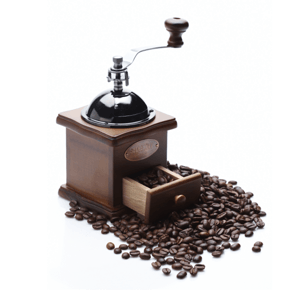The reason for the leading position of Kenyan Coffee in the World ranking
Follow the caf é (Wechat official account vdailycom) and found that Beautiful Cafe opened a small shop of its own.
Kenyan caffeine is well received in the global market for its aroma, taste and quality, but the industry has long been monopolized by Western multinationals. According to market research, only six companies control about 60 to 70 per cent of unprocessed coffee transactions in Kenya, followed by TAYLO WINCH,DIAMOND COFFEE in the UK, ARMAJARO Group in the UK, NEUMANN KAFFEE Group in Germany, DORMANS, which is controlled by UK companies, and LEOPOLD LUOIS DERYFUS, a French family business.
Kenyan farmers are at the bottom of the entire coffee value chain. In order to make the coffee trade more balanced and benefit farmers, the county government of the Ken coffee growing area decided to bring in buyers directly from countries such as China, South Korea, Japan and the United Arab Emirates.
Coffee buyers from the American Special Coffee Association (SCAA), Brazil, Colombia, China, Hong Kong and Myanmar have come to Kenya to seek direct deals with local farmers.
At present, 85% of Ken's exported coffee is auctioned through the Nairobi Coffee Exchange (NCE). The auction price of each bag of 50kg coffee is about 23000 Ken shillings (US $225.8), which can be sold directly to buyers for up to 30,000 Ken shillings (US $294.5), which will greatly increase the income of farmers.

According to the China-Africa Trade Research Center, Kenya accounts for about 1% of the world's coffee production, but only 5% of exported coffee is roasted beans, and 90% of Kenyan coffee is wet-processed. This shows not only the huge investment space in the Kenyan coffee processing industry market, but also the high market demand for coffee wet grinders in Kenya. In order to make Kenyan coffee trade more balanced and benefit coffee farmers, global coffee buyers are actively seeking to trade directly with Kenyan coffee farmers.
From the perspective of the international market, Kenyan coffee buyers are world-class high-quality coffee buyers, quality-oriented Germans and Scandinavians are long-term buyers of Kenyan coffee, and no country can grow, produce and sell coffee as continuously as Kenya. Kenya sells most of its coffee beans to Europe, while Germany is its largest importer.
From the perspective of Kenya's domestic market, the local coffee consumption market in Kenya has a limited share. This is mainly because there are fewer locals drinking coffee in Kenya. As a result, most coffee beans are sold abroad.
Seven coffee companies in Kenya are among the top 30 in the newly released Coffee Review (Coffee Review). It is reported that a total of thousands of coffee samples from all over the world participated in the selection, and the experts evaluated the coffee bean quality, producing area standard, tree species, flavor uniqueness and other indicators, and finally selected the 30 coffee with the highest score this year. The seven Kenyan coffee producers on the list are Guama Coffee Factory, Gatomboya Coffee Factory, David Mburu, Karatina's Kenya Small-lot Reserve, Karindundu Factory, Murang'a Gondo AA and Nyeri's Ichamara Coffee Factory.
At present, Kenya mainly relies on the direct export of coffee beans, and the total added value of the products is less than 5%, which makes a large number of coffee practitioners very limited profits.
Important Notice :
前街咖啡 FrontStreet Coffee has moved to new addredd:
FrontStreet Coffee Address: 315,Donghua East Road,GuangZhou
Tel:020 38364473
- Prev

Kenya AA coffee brewing tips
Pay close attention to the coffee review (Weixin Official Accounts vdailycom ) and find that the beautiful coffee shop opens its own small shop Kenya AA coffee only knows the clever brewing skills, but does not know how to taste coffee, then the original delicious food may become tasteless. Some coffee tasting is to use the tongue taste to feel, and some is to enjoy the kind of aromatic alcohol in the mouth, in addition to this, but also
- Next

What kind of Italian beans do we need?
Following Cafe Review (Wechat official account vdailycom) found that coffee beans tend to focus on the unique characteristics of a certain type of coffee when a beautiful cafe opens its own shop. And blended coffee, also known as mixed coffee, is to mix all kinds of single coffee beans together, so as to give full play to the strengths of various single coffee beans, learn from each other and make up for their weaknesses in taste.
Related
- Detailed explanation of Jadeite planting Land in Panamanian Jadeite Manor introduction to the grading system of Jadeite competitive bidding, Red bid, Green bid and Rose Summer
- Story of Coffee planting in Brenka region of Costa Rica Stonehenge Manor anaerobic heavy honey treatment of flavor mouth
- What's on the barrel of Blue Mountain Coffee beans?
- Can American coffee also pull flowers? How to use hot American style to pull out a good-looking pattern?
- Can you make a cold extract with coffee beans? What is the right proportion for cold-extracted coffee formula?
- Indonesian PWN Gold Mandrine Coffee Origin Features Flavor How to Chong? Mandolin coffee is American.
- A brief introduction to the flavor characteristics of Brazilian yellow bourbon coffee beans
- What is the effect of different water quality on the flavor of cold-extracted coffee? What kind of water is best for brewing coffee?
- Why do you think of Rose Summer whenever you mention Panamanian coffee?
- Introduction to the characteristics of authentic blue mountain coffee bean producing areas? What is the CIB Coffee Authority in Jamaica?

